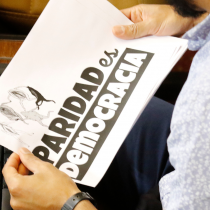
On May 7 of this year, voting will be held in our country to elect the constitutional councilors. It is important to note that there are three bodies that will aim to build a new Constitution for Chile. The Constitutional Council, the Expert Commission and the Technical Committee on Admissibility.
Let us remember that, at the end of last year, the political forces, represented in the political parties, agreed, for this new process, twelve constitutional bases, with different contents that should be present in the drafting of the new text. These bases would have as an aim, as emerged from the negotiations, and from the perspectives of the political forces, not to deepen political or ideological debates that, from some positions, would have harmed the previous process. Consequently, the decision was taken to establish these bases that will be a key and fundamental part of the new constitutional process.
As for the 12 agreements presented, among the aspects to be highlighted are: Establish that Chile is a Unitary and Decentralized State, Consecrate Chile as a Social State of Law, Consecrate the care and conservation of nature and its biodiversity. These three bases indicate a margin to continue deepening in terms of social rights, greater power in the regions, and to be able to generate foundations for the approximation of a sustainable model.
Another element to be highlighted is that the Constitutional Council will be composed on an equal basis. Undoubtedly, one of the few programmatic elements that was rescued from the previous constitutional process. Now, how significant is it to have a joint body in this new process?
It is important to understand parity as a democratic minimum, that is, it is the basis of any political system, since this gives it equity, representation, solidity and coherence.
Now, it is good to ask: Can we go beyond parity? It is something that we must bet, under the minimum basis of a Social State of rights, we must promote the importance of rights for women and gender and sexual diversities. The power to guarantee a life free of violence for women and gender dissidents, as well as the recognition of domestic and care work, are demands that must be enshrined in a new Constitution. It is important to argue that this is not a whimsical desire, or a proposal of a single sector, as an ideological discussion, as some tend to think.
In Chile we have one of the highest levels of gender-based violence. According to the IV National Survey on Violence against Women in the Domestic and Other Spaces (2020), 47.6% of women surveyed in the region, between 15 and 65 years old, said they had suffered some type of violence in their lives. 13.3% of women say they have suffered some type of economic violence during the last year, while in 2017 that number was 12.3%.
On the other hand, gender violence is also expressed in the private and public spheres, and an example of this is that women spend almost 3 times more time than men on unpaid work (cleaning, caring for children, the elderly) This is also violence, the fact that in Chile domestic and care work is not recognized, It continues to be one of the most latent inequalities in our country, consequently it deepens precariousness and does not give social value to one of the most important tasks in any society, care.
However, violence also manifests itself in those who today exercise paid and formal work. In Chile, 5% report having been a victim of violence in the workplace. Women between 25 and 30 years old, affiliated to isapres, pay 75,800 pesos more than men in the same age group. These data show us that gender inequality is still latent in public spaces, as well as in private ones.
From my experience as a woman, a caregiver, an informal worker, and a resident of Alto Hospicio, we observe day by day the gaps that exist between women and men, in addition to the gender violence that is expressed and even in the territorial characteristics of our commune. The precariousness of life continues to have a woman’s face.
We assume the challenge of going beyond parity, because we know that we are facing an opportunity to be able to guarantee greater security, dignity and rights to the women of our country, our region and community.Na. Promoting a life free of violence gives us the opportunity to address issues related to gender discrimination, economic violence, and structural violence that falls on women’s bodies and feminized bodies.
Follow us on
The content of this opinion column is the sole responsibility of its author, and does not necessarily reflect the editorial line or position of El Mostrador.
"El reclamo puede ser genuino, pero construido sobre una mentira", apuntó el presidente Javier Milei…
El gobernador de la provincia de Buenos Aires, Axel Kicillof, encabezó un acto en Ensenada…
El diputado nacional de La Libertad Avanza, José Luis Espert, expresó su confianza en la…
Tras la masiva reaparición de Cristina Fernández de Kirchner, el presidente Javier Milei apuntó contra…
El principal propósito de la nueva comisión es evaluar los recursos humanos en el Senado,…
En una medida que busca redefinir las condiciones de los seguros de automóviles en Argentina,…
Esta web usa cookies.